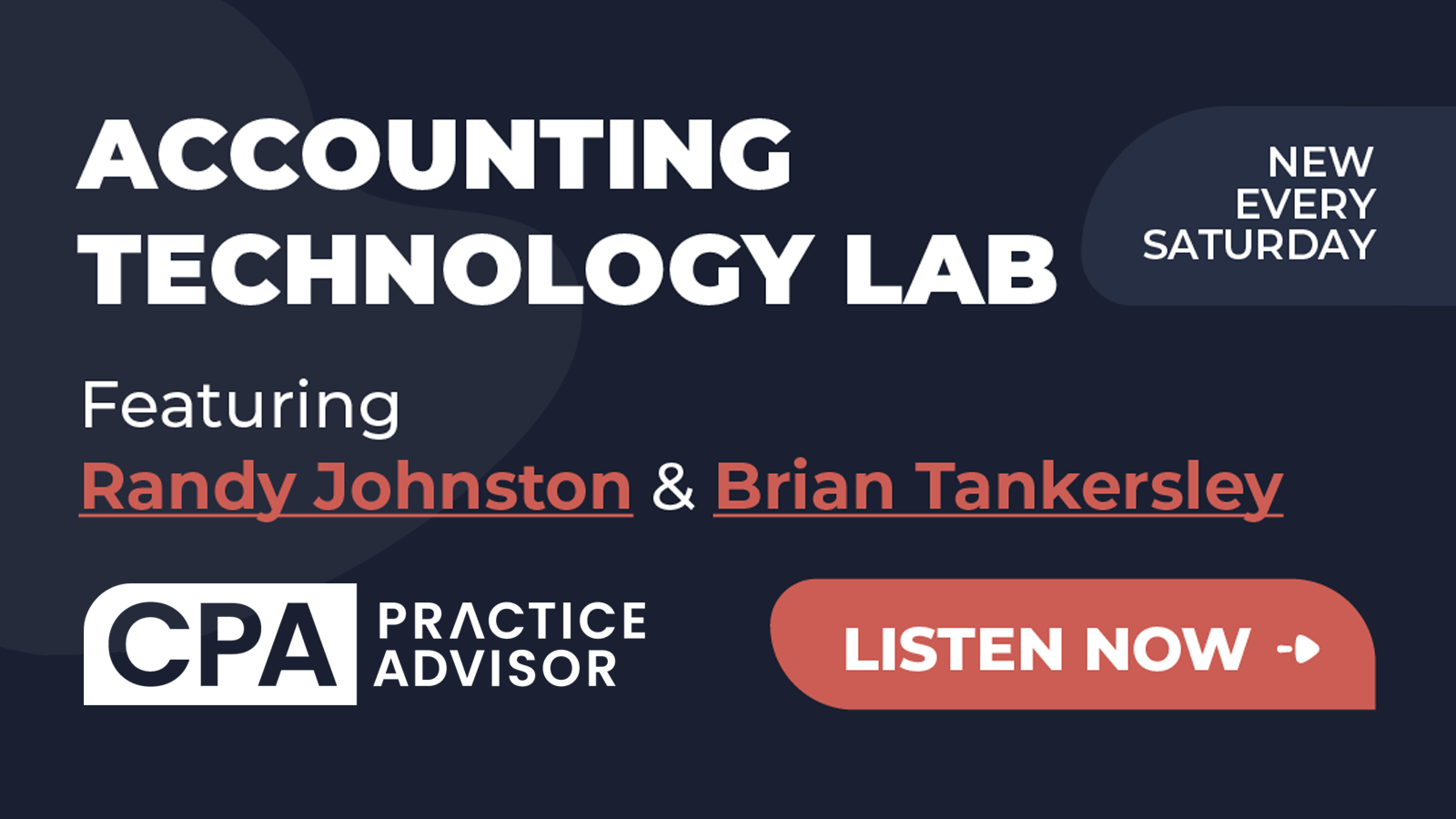Hosts Randy Johnston and Brian Tankersley, CPA, review Supervizor, a continuous quality assurance system that helps accounting firm’s error-proof their client’s bookkeeping and curb fraud.
Use the video player below to watch, or the podcast player below to listen to the podcast.
.
Or use the below podcast player to listen:
Transcript (Note: There may be typos due to automated transcription errors.)
Brian F. Tankersley, CPA.CITP, CGMA 00:00
Brian F. Tankersley, CPA.CITP, CGMA 00:00
Welcome to the accounting Technology Lab, sponsored by CPA practice advisor, with your host, Randy Johnston and Brian Tankersley,
Randy Johnston 00:10
welcome to the accounting Technology Lab. I’m Randy Johnston with co host Bryan Tankersley, this week, we’re going to talk about a higher end tool which may fit some of you may just fit some of your clients called supervisor, spelled with a Z, supervisor. Now, this company was founded in 2016 they’ve been growing at a fairly, fairly good rate, according to their CEO, Albin clot, which I had the privilege of meeting and speaking with. It is intended to do continuous audit analytics for larger companies. Now they’re integrated to lots of different platforms, and they have been penetrating the market. Well, we’ll talk about their fundraising and other things in a minute, but let’s turn our attention to the capabilities first. So Brian, what would you like our listeners to know about this platform?
Brian F. Tankersley, CPA.CITP, CGMA 01:04
Well, this is really, think of this again as a continuous audit platform. And continuous auditing is something that’s been a thing in the Fortune 500 for for many years. But the idea is to is to go through and proactively detect things in near real time, unusual transactions, you know, duplicate payments, data entry errors, other things like this
Randy Johnston 01:28
and Brian, the risk of interrupting you. I know you’ve been a fan of continuous audit since you first like conceptualized it or heard about it. That probably for our normal listeners who don’t know this about Brian, he usually introduces himself as a recovering auditor, and he’s done both internal and external audit. It’s been a while back, but we do follow quality standards on audit, and we follow risk management and continuous I
Brian F. Tankersley, CPA.CITP, CGMA 01:54
mean, the leading edge, the leading edge, large governmental agencies, the leading edge, the leading edge fortune. 500 companies were doing this 25 years ago. So I mean, I distinctly remember an Institute of Internal Auditors conference that I went to in Orlando again 25 years ago, where we were talking about these things. But the idea is that you ingest all of this data, so they actually have integrations with a wide range of different tools. And the idea is it’s a plug and play analytics platform that goes through and looks for anomalies and looks for compliance with common controls, so that you can kind of see what’s happening in here, but but it does investigate and work with 100% of the transactions that go through. Go through things. So you can, again, some of the platforms like SAP, you can directly connect to this. Say, there are a number of Stage products you can directly connect to as well, but they’ve also got it set up where you can, you can use FTP to upload if you have a platform that’s not directly integrated in here. But you can see again that they’re they’re focused again on mid market and enterprise. So you’ve got dynamics 365, and Oracle and SAP and sage and Oracle, NetSuite and Unit Four in here. Again, those are all tier two, tier three. ERPs, so again, well ensconced in the mid market, some of them tier one, tier two. But the idea behind this now is that you’re going to ingest all that information. They have a pre built library of controls, and they they also have some workflows set up to automate investigating anomalies, and then, then also some Power BI reporting. So that gives you, that gives you both data in in a drill down platform, but it also gives you the ability to create custom reports to meet your specific needs, which, again, in tier one, tier two is the ball game.
Randy Johnston 04:01
When I did the demonstration on this platform, Brian, I was impressed that they had predefined about 350 controls, and then it’s pretty trivial to set up a an additional control that you’d like to have in place. They claimed that they’re supervising over 100 billion in revenue on the companies they have today, working in 40 countries, with over 1000 subsidiaries monitored. So you just think again about large companies, multi location, that really is very impressive. And I think you already talked maybe a bit more about those 350 plus control points?
Brian F. Tankersley, CPA.CITP, CGMA 04:41
Well, they, they do have, they do have a wide range of different control points that are pre programmed in So, 86 in accounts payable, 55 in receivables, 66 in socks, and then many, many others in here. Again, I’m not going to lie to you, this is not something that’s going to fit directly in your CAS practice. Okay, so. This is something that is really going to be more. You’re going to run into this more in large engagements, large businesses, especially ones that have significant regulatory compliance requirements. So I would think in most of your practices, your big nonprofits, your big governmental agencies that you work with are going to be the places where you’re going to have this because in many cases, you’ll have federal funds, and you’ll you’ll need to have those, those anti fraud protections to protect you from any kind of corporate culpability. So anyway, as we’re as we’re looking at this, though, the the idea is that you’re getting to 100% analysis of transactions. Instead of some some sampling of some sample of them. It also, again, with the workflows set up, you can, you can manage the the the flow of these transactions, so that you’re not drinking from from the fire hose of transactions at these huge organizations. Again, they’ve got a wide range of big companies here. Again, I want you to see that very few, you know, again, there’s, there seem to be concentrated on Europe. It looks like, looks like quite a few European Union countries in here. But it’s a, the key thing I would just suggest to you here is that, is that again, they, they think that you can get started in a couple of months with this, yeah,
Randy Johnston 06:26
and in fact, you know the implementation time they, they claim to be, typically days, or at most, a couple of weeks. And because they have so many accounting practices and almost a decade of experience at this point, they’re pretty confident in that. Plus it’s, it’s mainly in the core financials, G, l, a, p, A, R, but it’ll also look at master data like NPOs, as well as user data and travel and expense. So you know all of those things are, you know things that have been in this product for a while, but in on May 28 of 2024 this particular organization raised an additional $22 million in Funding. This came from Orange ventures, with additional participation from wild finance, the Mason partners, new alpha asset management, Adela capital and Isai. And so the goal of this particular fundraising round was to expand their sales imprint, footprint, sorry, and their integrations to multiple platforms. So you could take a little look at you know that, if you’d like to know more about it, but you know this, it was so close to your heart. I thought Brian on the real time auditing. I thought it was worth our listeners being aware of it, particularly for their larger clients. So any closing thoughts do you have on supervisor? Well,
Brian F. Tankersley, CPA.CITP, CGMA 08:08
this kind of, this kind of compliance and this kind of real time auditing is something that’s been overdue in the audit profession, in the external audit profession, for some time. It’s going to be hard to get, you know, it’s going to be a rough transition to transition over to this 100% testing. But again, I wanted to show this to you here, just to kind of, you’re just to kind of remind you that the rest of the world has not, has not stopped spinning and in the big spit, in the big enterprise space, these kinds of compliance tools are present, and they will start to be applied at smaller and smaller businesses over time. So again, as we as we get into process automation, other things, and we get into tools like process mining, these, these continuous audit tools, are going to also change the game. And I think it’s important. You know they exist. It is
Randy Johnston 09:03
important. And you know this company, which started in Paris, which many of us put our attention on this summer, has an office in Brooklyn, so their US footprint is expanding, and I think it has a position for your clients and for the future. So we appreciate you being with us again and listening in and we’ll talk to you again soon in another technology lab.
Brian F. Tankersley, CPA.CITP, CGMA 09:31
Thank you for sharing your time with us. We’ll be back next Saturday with a new episode of the technology lab from CPA practice advisor. Have a great week.
= END =
Thanks for reading CPA Practice Advisor!
Subscribe Already registered? Log In
Need more information? Read the FAQs


